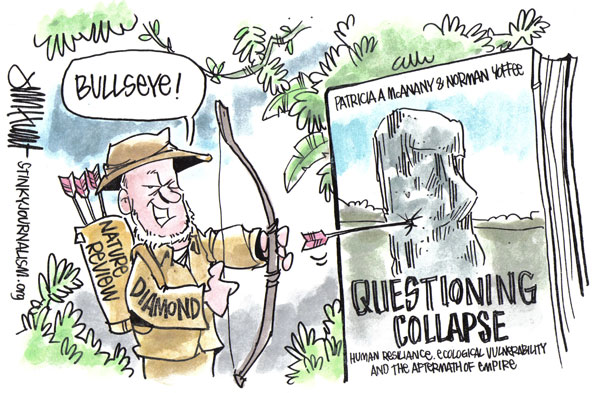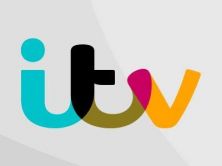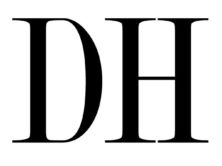
Why did Nature's editors select Jared Diamond to review Questioning Collapse, when the book is solely a negative critique of Diamond's book Collapse? Did the book review editor really think a glowing review or even a lukewarm one, was even possible? (Credit: Jim Hunt)
This may not be the only time the subject of a critical work has reviewed the book that critiques them. But, by failing to disclose that Questioning Collapse is a critique of his own research, Diamond misleads readers into viewing his book review as something it is not–the dispassionate opinion of an outside observer.

Diamond–the subject of several StinkyJournalism investigations into errors and ethical lapses in his reporting on Papua New Guinea, and of a libel lawsuit by Daniel Wemp, the single source for his New Yorker essay “Vengeance is Ours”–is the author of Collapse: How Societies Choose to Fail or Succeed.
Questioning Collapse, published by Cambridge University Press, features a group of essays collected from and after a meeting of the American Anthropological Association that were directly intended to address “issues swirling around the popular writing of Jared Diamond.” The essays critique specific passages and arguments of Diamond’s book, as well as argue against the more general themes of human history Diamond describes.
Yet, Diamond’s review in Nature, a prestigious journal of science and medicine, makes no mention of this. It might, then, appear to a reader of Nature with no prior knowledge of his relationship to the book under review, to be the opinion of an independent expert. Given that Questioning Collapse is a refutation of his own work, Diamond cannot be considered as such, and he is ethically responsible not to–purposefully or accidentally–masquerade as such.
The arguments Diamond offers would not have been problematic published as an academic response to Questioning Collapse. Critiqued by other researchers, scientists should and do routinely respond with explanations and further critiques.
However, when readers see a book review, they expect an expert opinion on the quality of a book. Because Questioning Collapse is critical of Diamond, his relationship with the book’s subject matter and authors calls into question Diamond’s ruling on the quality of this book.
If Diamond had disclosed the relationship, readers would have been able to, at least, use that knowledge to evaluate the fairness of the negative review. As it stands, the review is ethically problematic as a piece of critical journalism.

Questioning Collapse, on left, is a book that is solely a critique of Jared Diamond’ s book, Collapse, on the right.
Anthropologists Deborah Gewertz’s and Frederick Errington’s contribution, “Excusing the Haves and Blaming the Have-Nots in the Telling of History,” is among the essays in Questioning Collapse. They plan to write to Nature editors to protest.
Further, Gewertz and Errington addressed the principles involved in an email to iMediaEthics, “If a scientist reviews a book critical of his own work without revealing his relationship to that book, it renders questionable his integrity; if a scientific journal encourages the scientist to do so, it renders questionable its legitimacy.”
iMediaEthics’ view? Nature needs to disclose to their readers the conflict of interest between Diamond and the book he reviewed. A correction and apology should also be made. Finally, in fairness, Nature should ask a truly objective and dispassionate expert to review Questioning Collapse as remedy.
When Nature’s editors chose Diamond to review this book, they predetermined the outcome–a negative review–which is exactly what they got. Furthermore, by not disclosing that the “Collapse” in the title of the reviewed book refers to Diamond’s own book, Collapse, Nature failed to be honest and open with its readers.
We have called and/or emailed Nature, Jared Diamond, Questioning Collapse authors, and Cambridge University Press, the publisher of Questioning Collapse, and will update with any responses we receive.
*Hat tip to PublishingArchaeology and commenter Ryan Bauman, for pointing out that Diamond’s Nature review existed.
**Here is link to larger image of Jim Hunt’s cartoon shown above. Please feel free to republish it. Just provide credit line.
UPDATE: 02/28/2010 10:33am EST: One of the authors of a chapter in Questioning Collapse, Carl Lipo, just posted his thoughts about Diamond’s Nature review on his blog, see “Diamond on Diamond,” EvoBeach.com.
Lipo writes: “…The MAJOR problem with his review is that it makes no mention that the book he is reviewing is a critique of HIS book, Collapse. Of course he hates it! It largely serves to undermine his particular platform by pointing out the numerous problems in his own work. The editor of Nature is largely to blame for this — it unscrupulous and dishonest. Based on this event should we believe *ANY* of Nature’s book reviews?”
UPDATE: 02/28/2010, 12:20pm EST: Contrast Diamond’s negative book review in Nature with anthropologist Krista Lewis’ positive review in Science. (Krista Lewis, “Did They Fail? Could They Choose?” Science 22 January 2010: Vol. 327. no. 5964, pp. 413 – 414). Full citation for Diamond’s review: Jared Diamond, “Two views of collapse,” Nature 463, 880-881 (18 February 2010)
UPDATE: 03/1/2010 11:25 EST: In response to feedback from one reader — iMediaEthics does not take issue that Diamond is not identified as the author of “Collapse.” (He is identified as the author of “Collapse” in the author box at the end of the review). We are responding to the fact that Diamond does not make clear that “Questioning Collapse” is a book directly critiquing his own book. This fact is not disclosed anywhere in the review.
UPDATE: 03/04/2010 – New Post on iMediaEthics — Go to: Nature (Journal) responds to charge that Jared Diamond’s book review had undisclosed conflict
UPDATE: 03/06/2010: 2:00PM EST: Ann Altman, PhD in Molecular Biophysics and Biochemistry, who commented below about her experience with Jared Diamond, wrote in the blog, Evolution Beach, that she is “the translator of “Early Visitors to Easter Island” and “Easter Island and Its Mysteries,” which is available for free at www.chauvet-translation.com. ”
UPDATE: 03/17/2010 7:13PM EST – Jessica Palmer at the science blog, Biophemera, mentions our coverage of Diamond’s Nature review. She writes,
“I think it’s unlikely that Nature readers, particularly those readers interested in a book review on this topic, would not know who Jared Diamond is. Assuming they do know who he is, they know precisely what they’re getting. But what if they don’t know? Is Stinky Journalism right that the risk a Nature reader would not know Jared Diamond was writing a biased review – more of an op-ed than an objective analysis – makes failing to disclose his personal views on the topic unethical?”
Palmer says she doesn’t think so, making the justification as did Nature, namely, that Diamond’s author-bio states he is the author of the book, Collapse, and that is good enough. She writes, “That [the bio] sounds like pretty typical academic-speak for ‘ I don’t agree with these people.’ What more would Stinky Journalism want? A separate page-long bio of Diamond outlining his general beliefs about defunct societies?”
Actually, all that iMediaEthics (and a range of science and ethics experts) would want is a clear disclosure in the review that Questioning Collapse was a book critical of Diamond’s work. Simple as: “Questioning Collapse is a book of essays critiquing specific issues and general themes in my work, specifically my book ‘Collapse’.” Unless this is specifically stated or one knows the book, you would believe that Questioning Collapse was a generic book on societal collapse–not specifically about Diamond work.
Palmer also writes that she didn’t think this lack of disclosure was misleading, saying:
“Given that this review is in a specialist journal, and its readers should know better than to take an academic’s assertions about their direct competition at face value, I don’t think Nature needed to do more than they did.”
To this, iMediaEthics has two responses: one, Nature is not Anthropology Today, a true “specialist journal.” It’s a general science journal. I don’t think it’s realistic to think that, for example, the average material science physicist reading Nature is up on Jared Diamond’s fights with anthropologists; and two, how is that same physicist even to know that Diamond is reviewing a book that is all about him and his work?
But as Bruce V. Lewenstein, a professor of science communication at Cornell University, explains above, scientists and journalists do need to clearly disclose such conflictsto protect all their readers and to avoid reproach for hiding their biases. He told iMediaEthics , “the whole point of disclosure is to put it out there so even if there’s just one person who doesn’t know, they’ll be notified.” (Note: a version of this update was also posted in Biophemera comments).
Update: 03/17/2010, 7:48PM EST- Alex Golub (Rex) at SavageMinds discusses the theoretical back and forth between Questioning Collapse and Collapse.
| External Links | |
| GDF Director’s Blog- Gary Martin, | “Questioning Collapse,” Feb 3, 2010 |
| John Hawks’ Blog- John Hawks, | “Collapsing reviews,” Feb 2010 |
| Ke Kaula Blog- Ghostraptor, | “Update (Rats, People and Rapa Nui),” Mar 11, 2010 |
| Cambridge University Press Blog, | “Puttin’ the Objective in Objectivity,” Mar 8, 2010 |
| Nanopolitan Blog- T.A. Abinandanan, | “Fail: Why Do Some Book ‘Reviews’ Collapse and Self-Destruct?”, Mar 6, 2010 |
| Adventures in Ethics and Science Blog- Janet D. Stemwedel, | “Objectivity, conflicts of interest, and book reviews,” Mar 4, 2010 |
| Bioephemeara Blog- Jessica Palmer, | “Disclosing (obvious) biases in book reviews: were Nature and Jared Diamond wrong?”, Mar 17, 2010 |
| Savage Minds Blog- Alex Golub, | “Questioning Collapse,” Mar 16, 2010 |
| Evolution Beach- Carl Lipo, | “Diamond on Diamond,” Feb 27, 2010 |
| Cambridge University Press Blog, | “From the Editors of Questioning Collapse: Requesting Full Disclosure,” Mar 22, 2010 |





